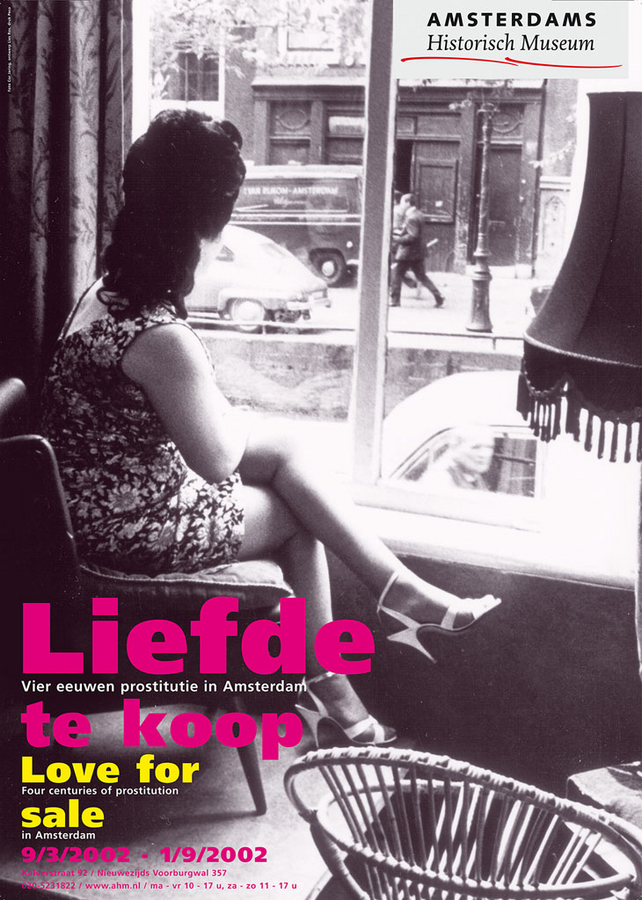In her article ‘Red lights in the Museum’ Annemarie de Wildt (curator of the Amsterdam Museum) describes the exhibition ‘Love for Sale’, which ran in the Amsterdam Museum in 2002.[1] This unconventional subject seemed like an inevitable choice for the Amsterdam Museum, since Amsterdam has a long history with prostitution and is now well known for the red light district. De Wildt explains the choices they made and the reactions they got after opening the exhibition. The museum focused on the experiences from the prostitutes themselves. This way the women in the red light district became more than objects, they became people with an unusual job. De Wildt describes the difficulties the museum had with displaying sexual pictures but also showing pictures of women who didn’t get the chance to give permission. She explains that the aim of the exhibition was to make people think about the subject, which is why the museum didn’t want to take a moral stance.[2]

This exhibition ran in 2002, just after the liberation of prostitution. As de Wildt describes: in 2000 the ban on prostitution was lifted, all in the spirit of the Dutch liberal attitude: people should be able to do whatever they want. If women want to work as prostitutes, they should be allowed. Even while brothel owners had to get a permit, the ones with a bad track record we’re still able to continue doing their work, after a little lesson about hygiene.[3] This liberal view on prostitution is clear in de Wildts article. Even while the museum claims not to want to take moral stance on prostitution, the fact that they organised it, shows that they see it as a part of life, and especially an important part of Amsterdam. They portray it as an unusual job, and focus on women who have chosen the job themselves, although they do often do mention their motivation: money.
Lately the debate on prostitution has been growing again: on the one hand there are people who say that escorts and prostitutes are independent women who choose this profession, not only because they need the money, but because they enjoy it.[4] Being a woman who enjoys sex is slowly becoming less of a taboo, although double standards are still around. But another group of people is starting to speak up: (ex-)prostitutes who claim that the world of professional sex is not as glamorous and free as we like to think. Dutch newspaper de Volkskrant published an article by Renate van der Zee who also claimed that we have to stop romanticizing prostitution. Even if women claim to enjoy having sex, that doesn’t mean that prostitution is always a fun job. Van der Zee has written several books on prostitution for which she talked to women who worked as escorts and prostitutes. She heard many stories of abuse and rape, which led to mental issues. The women also told her that no one ever talked about these issues, what happened while you were at work stayed at work.[5] That would mean that rapists within the environment of prostitution would never be prosecuted, at most they would be denied any further service.
By acting as if prostitution is part of life, we act as if it is normal that a woman’s body can be for sale. If a man pays, he has the right to do whatever he pleases. Even though prostitution is a part of our society, normalizing it seems dangerous to me. Unfortunately I haven’t been able to see the exhibition, so it is hard to make a fair judgement about the way the museum dealt with the subject, but he title of the exhibition seems to imply a romantic perspective: Love for Sale. I think everybody, for or against prostitution, can agree that this title doesn’t tell a true story. Love is definitely not the product: the product for sale is sex, or maybe even just a body.
- Lise Claerhoudt
[1] Annemarie de Wildt, ‘Red lights in the museum’, City Museums as Centres of Civic Dialogue? Proceedings of the Fourth Conference of the International Association of City Museums, 3-5 November, 2005. Ed. Renée Kistemaker. Amsterdam: Amsterdam Historical Museum, 2006. 173-180, aldaar 173.
[2] De Wildt, ‘Red lights in the museum’, 174.
[3] Ibidem.
[4] Margot C. Pol, ‘Ik ben er trots op dat mensen dankzij mij een hoogtepunt bereiken’, De Volkskrant, 24-06-2017, https://www.volkskrant.nl/magazine/-ik-ben-er-trots-op-dat-mensen-een-hoogtepunt-bereiken-dankzij-mij~a4501715/, 16-10-2017.
[5] Renate van der Zee, ‘Hou toch eens op met het romantiseren van prostitutie’, De Volkskrant, 22-07-2017, https://www.volkskrant.nl/magazine/-ik-ben-er-trots-op-dat-mensen-een-hoogtepunt-bereiken-dankzij-mij~a4501715/, 16-10-2017.